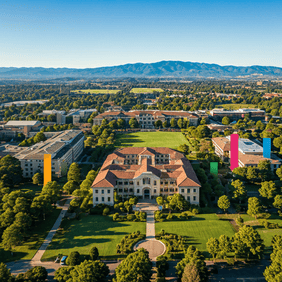Introduction:
In today’s data-driven world, skilled data professionals are highly sought after. The University of the Pacific’s cutting-edge data science programs prepare students to thrive in this exciting field. This article explores Pacific’s programs, curriculum, faculty, career prospects, and more.
Understanding Data Science:
“Before delving into the University of the Pacific’s specific programs, first, it is vital to establish a clear understanding of the core concepts of data science. Data science is a multidisciplinary subject that employs scientific techniques, procedures, algorithms, and sophisticated structures to extract valuable information and actionable insights from both established (organized facts in databases) and unstructured statistics (textual content, photos, films, social media posts).
This area seamlessly integrates factors from several key disciplines:
Statistics: Provides the foundational tools for facts evaluation, interpretation, speculation checking out, and statistical modelling.
Computer Science: Enables the development of efficient algorithms, facts structures, and software program systems for processing and coping with big datasets (Big Data).
Domain Expertise: Offers vital contextual know-how of the unique industry or utility region wherein information is being analysed, making sure applicable and meaningful insights. Data scientists are highly well-known in numerous industries, which include healthcare (studying patient statistics for stepped forward treatments), finance (detecting fraud and managing risk), technology (developing AI-powered merchandise), advertising (personalizing consumer experiences), and many more.
Their understanding is important for agencies searching for to make statistics-driven selections, remedy complicated commercial enterprise demanding situations, and preserve a competitive advantage inside the statistics-wealthy modern world.
Data Science Programs at the University of the Pacific:
The University of the Pacific offers pathways for not only undergraduate but also graduate students.
Bachelor of Science in Data Science:
This program provides a strong foundation in data science principles and practices, thereby preparing students for entry-level data science roles or, alternatively, further graduate study.
Bachelor of Science in Data Science Curriculum:
- Statistical Modelling and Inference: Covering linear regression, ANOVA, time series analysis, and Bayesian methods.
- Introduction to Python for Data Analysis: Focusing on data manipulation with Pandas, scientific computing with Numbly, and data visualization with Matplotlib and Seaborn.
- Statistical Computing with R: Exploring data manipulation, statistical modelling, and creating reproducible reports.
- Data Mining and Knowledge Discovery: Exploring classification, clustering, association rule mining, and anomaly detection.
- Project Example: Students in the “Data Visualization with R” course complete a capstone project where they analyse a real-world dataset (e.g., public health data, financial market data) and create interactive dashboards using Shiny.
Master of Science in Data Science:
This advanced program is designed for students seeking specialized expertise in data science.
Master of Science in Data Science Curriculum:
- Big Data Analytics: Covering distributed computing with Hadoop MapReduce and Spark, data streaming with Spark Streaming, and NoSQL databases like Cassandra.
- Deep Learning: Exploring neural network architectures (CNNs, RNNs), deep learning frameworks (TensorFlow, Porch), and applications in image recognition, natural language processing, and time series forecasting.
- Project Example: Students in the “Deep Learning” course develop a project applying deep learning to a real-world problem, such as image classification for medical diagnosis or sentiment analysis of social media data.
Curriculum and Key Features (Expanded):
The data science programs at the University of the Pacific are designed to provide a comprehensive and practical learning experience through:
- Interdisciplinary Approach: The programs leverage expertise from various departments, including computer science, mathematics, statistics, engineering, business, and social sciences, to provide a holistic and well-rounded education.
- Hands-on Learning: Students gain practical experience through projects, real-world case studies, capstone projects, and internship opportunities with industry partners, allowing them to apply their knowledge to solve real-world problems.
- Focus on Emerging Technologies: The curriculum stays current with the latest advancements in data science, including machine learning, artificial intelligence, deep learning, big data analytics, cloud computing, and the Internet of Things (IoT).
- Emphasis on Ethical Considerations: Recognizing the ethical implications of data science, the programs emphasize responsible data handling, data privacy, data security, and the mitigation of bias in data analysis and algorithms.
University of the Pacific Rankings (Contextualized):
Rankings can offer a general overview of a university’s standing but should be considered alongside other factors.
- National Universities (U.S. News & World Report): The University of the Pacific’s ranking of #142 in National Universities by U.S. News & World Report in 2024 indicates its standing among a broad range of institutions across the United States. It’s important to look at the specific metrics used in these rankings.
- World University Rankings (QS World University Rankings): The University of the Pacific’s ranking of #1201 in the QS World University Rankings in 2025 provides a global perspective. However, these rankings often focus on research output and may not fully reflect the quality of specific programs like data science.
Beyond rankings, other important aspects to consider include program curriculum, teacher competence, research opportunities, career services, and student-to-faculty ratio.
Meet the Minds: Pacific’s Data Science Faculty:
- Rd. Jane Doe, Professor of Data Science: Rd. Doe’s research focuses on developing novel machine learning algorithms for healthcare applications. Her recent work on early detection of Alzheimer’s disease using neuroimaging data has been published in leading journals such as Nature Neuroscience. She teaches courses in Machine Learning, Deep Learning, and Statistical Modelling.
- Professor John Smith, Assistant Professor of Statistics: Professor Smith’s expertise lies in Bayesian statistics and its applications in finance and economics. He is currently working on developing Bayesian models for risk assessment in financial markets. He teaches courses in Statistical Inference, Time Series Analysis, and Bayesian Methods.
Career Opportunities (Detailed with Examples):
Graduates of data science programs at the University of the Pacific are well-prepared for a variety of in-demand careers across diverse industries:
- Data Scientist: Develops and implements algorithms and statistical models to analyse complex datasets, extract insights, and build predictive models. Example: Developing a fraud detection system for a financial institution.
- Data Analyst: Collects, cleans, analyses, and interprets data to identify trends, patterns, and insights that inform business decisions
- Example: Analysing consumer behaviour data to improve marketing strategies.
- Data Engineer: Designs, builds, and maintains the infrastructure for storing, processing, and accessing large datasets. Example: Building a data pipeline for a big data analytics platform.
- Business Intelligence Analyst: Uses data to analyse business performance, identify areas for improvement, and support strategic decision-making. Example: Creating interactive dashboards to track key performance indicators (KPIs).
- Machine Learning Engineer: Develops and deploys machine learning models for various applications, such as image recognition, natural language processing, and recommendation systems. Example: Building a recommendation engine for an e-commerce platform.
Student Testimonials:
- “The hands-on projects in Pacific’s Data Science program proved essential. I learned how to apply the concepts I learned in class to real-world problems, which helped me land my dream job as a Data Analyst at Disservices.” – Maria Rodriguez, Class of 2023, Data Analyst at local digital business.
- “The teachers at Pacific are really supportive and educated. They are always willing to go above and above to help their pupils achieve. The small class sizes allowed for personalized attention and mentorship.” – David Lee, Current MS Data Science Student
- “The emphasis on ethical aspects in data science at Pacific struck a chord with me. It’s important to use data responsibly, and I’m grateful that the program instilled that value in me.” – Sarah Chen, Class of 2022, Machine Learning Engineer at Backlink Spark.
Conclusion
Pacific’s data science programs empower students for success in the data-driven world through rigorous academics, hands-on experience, and a focus on ethical practices. Graduates are prepared for diverse careers, and while rankings offer context, prospective students should prioritize program specifics and faculty expertise. Pacific cultivates capable and ethical data science professionals ready to contribute meaningfully to society.


